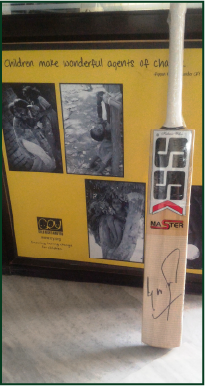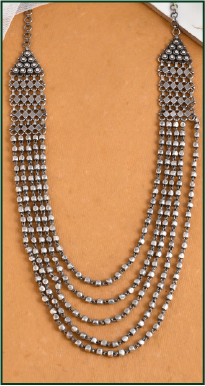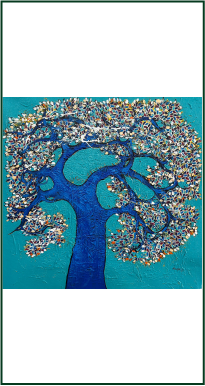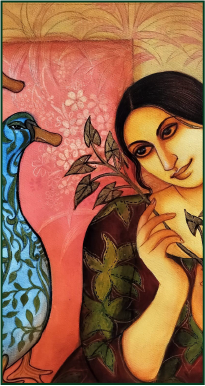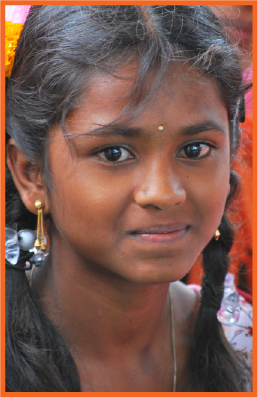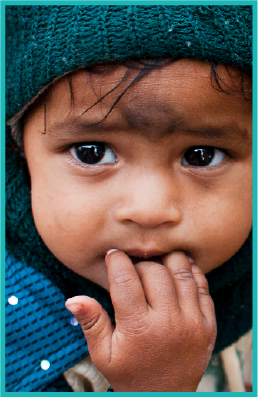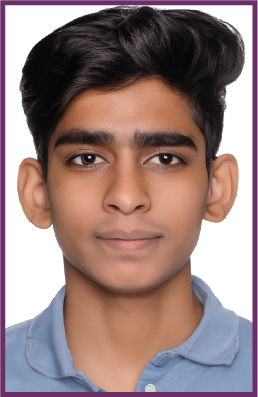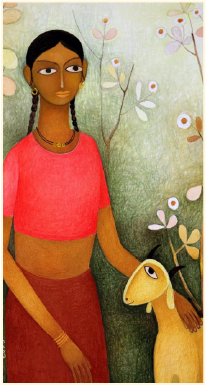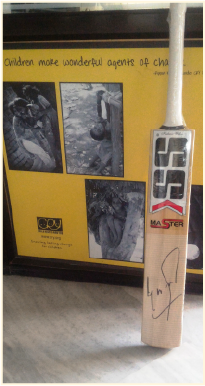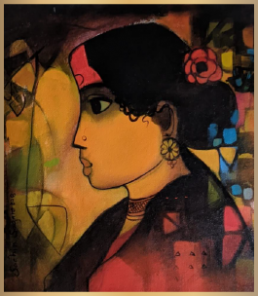Projects
Project RWDS 2024
Dharshika’s Journey From Adversity to Hope
Dharshika, an eight-year-old girl from Maruthanthoppu village in Tamil Nadu, faced numerous challenges. Her family, palm sap tappers and daily wage laborers, struggled with poverty and the burden of transportation, as schools were far from their village. After her mother’s death and her father’s abandonment, Dharshika and her elder brother Akash were cared for by their elderly grandparents.
After her uncle, who supported her schooling, died in a tragic accident, the family was left in turmoil. With no other financial support, Dharshika dropped out of school during her 3rd grade, joining her brothers and cousins who had also left education to work.
CRY America project RWDS, identified Dharshika’s situation through home visits and community engagement. The project team counseled her grandparents, emphasizing the importance of continuing her education and gradually managed to get her re-enrolled in school. Though her transport costs were partially covered by the local workers’ union, the financial strain persisted. In April 2024, her grandparents, overwhelmed and financially strained, sought alternative solutions for Dharshika’s education.

The project team approached the District Child Protection Officer (DCPO) for assistance, who recommended enrolling Dharshika in the same hostel where Akash, her brother was also enrolled. With the team’s support, Dharshika was admitted to the hostel. Both siblings thrived in their new environment, supported by caring staff and a nurturing community.
Through diligent tracking, community involvement, and effective intervention, Dharshika was not only back to studies but also found a stable, supportive educational environment, ensuring her continued progress and well-being.
One of the key problems of Ramanathapuram District, Tamil Nadu is the high number of child laborers. The reasons being, lack of livelihood opportunities, indebtedness, door pick up for child laborers working in salt pans and seafood processing units, no access to schools, increasing private schools, etc. In addition to it, high cost for transport adds on to the severity of the problem that children and communities face.
CRY America’s Project RWDS works towards focusing engagement in ensuring increased retention of school going children from 70% to 80% and ensuring physical access to schools, infrastructure & quality within schools & ICDS centers, increasing child participation. The key activities under the project are supporting groups formed in all 52 villages comprising community volunteers, Anganwadi Workers (AWW), local youth and panchayat members, ensuring regular administration of immunization, initiating supplementary classes in 5 villages.
1187
children transitioned to the next grade
11
dropouts re-enrolled in school

41
children attended Supplementary classes
7
Child Labor removed from labor and re-enrolled
78
Adolescent Girls Collective meetings held where 566 participated
28
Adolescent Boys Collective meetings held where 173 participated

39
children granted education scholarships from Labor Department
190
children trained on life skill sessions

● Ensuring 10th and 12th grade students to re-appear for exams this year and pass
● Enrolling 14 dropout children in their respective classes
● Removing 20 Children from labor and mainstreaming them in formal education
● Conducting Stakeholder Training for Village Child Protection Committee & School Management Committee members
● Rolling out of Year 3 Life Skills Modules across all the children and adolescent collectives.
● Implementing Parents Modules among at least 100 parents
● Ensuring Gram Panchayat sanctioned infrastructure like separate toilets for girls, school compound, anganwadi renovation etc. in 10 schools
2023 Grant Disbursed $39,240
2024 Grant Approved $53,573
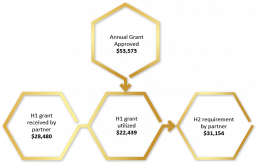
Project PORD 2024
Overcoming Transportation Challenges: Ensuring Access to Education for Rural Children
The lack of public transport and unsuitable bus timings in many routes in the PORD operational area were causing difficulties for 323 school-going children. The issue was particularly concerning because it made the children vulnerable to dropping out of school, and falling prey to child labor or even being forced into child marriage. Some children were already walking miles or availing private share autos to reach school, which was a concern of safety for their parents.
To ensure continued access to education for children from the villages facing challenges due to public transport, the PORD team initiated discussions in child collectives and community based organisations (CBOs) to raise awareness about the urgency of the situation. The CBO members and parents came forward citing the issue, the bus routes, and the number of children affected.
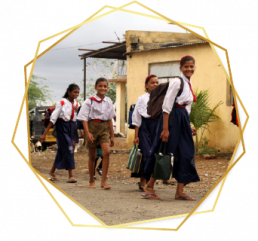
As a result of their advocacy efforts, the Andhra Pradesh State Road Transport Corporation (APRTC) allocated new bus facilities in two of the routes. The buses were scheduled to operate during school timings, benefitting a total of 115 children in the PORD operational area. The new services not only enable children to attend school regularly but also allow them to explore the possibility of returning home and attending school as a day scholar.
There are many areas in Chittoor, Andhra Pradesh that are rural. The sub-districts have no government hospitals. 66% villages do not have access to primary schools, children have to travel 1 to 5 kms to reach school. The hamlets do not have adequate roads, public transport and safe drinking water.
CRY America project PORD started activities such as monitoring Anganwadi centers while ensuring re-enrolment of dropout children. Awareness programs and life skill sessions were conducted as part of children’s collectives. Through PORD’s work, thousands of children are actively engaged in children’s collectives to change the course of their own lives as well as those of their peers.
608
children enrolled in pre school
67
child laborers mainstreamed into school
61
drop out children re-enrolled in school

38
child marriages were averted / stopped
83
Anganwadi teachers trained in Early Childhood Care and Education (ECCE)
934
Community Based Organisations members oriented on the importance of ECCE programme
1360
adolescent girls covered under life skills sessions
419
children transitioned from 10
th to 11th grade
147
Children and Adolescent Girl’s collective meetings conducted

● Conducting Base Line Survey in 11 new slums in Madhanapalle urban.
● Formation of Child Collectives, Adolescent Collectives in 11 new slums.
● Mainstream 50 drop outs.
● Prevent/avert 40 child marriages.
● Implement year 2 life skills module.
● Implement Parent’s module
● Sensitization of CBOs and VCPCs in 41 villages.
2023 Grant Disbursed $41,843

Project DVEUS 2024
Nurturing Hope Through Proactive Maternal and Child Health Initiatives
Anita Devi’s journey exemplifies the transformative impact of proactive maternal and child health interventions. Facing challenges in providing adequate nutrition for her four children due to limited financial resources, Anita’s plight caught the attention of the CRY America project team.
With the family’s primary income stemming from her husband’s labor in the fields, financial constraints loomed large. When growth monitoring conducted by the project team revealed that three of Anita’s children were severely underweight, it underscored the urgent need for intervention.
It was found that inadequate breastfeeding, lasting only a few months, had contributed significantly to the children’s malnourishment. Recognizing the necessity for comprehensive support, the project team adopted a holistic approach when Anita was expecting her fourth child.
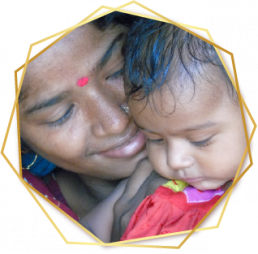
The project team facilitated her enrollment in Anganwadi and ANM records, ensuring she received necessary vaccinations. Throughout Anita’s pregnancy, the project team guided her through her antenatal tests, stressed the benefits of institutional delivery, and emphasized the importance of colostrum feeding for the child’s health.
As a result of these interventions, Anita’s fourth child thrived, highlighting the significant positive impact of targeted health initiatives in resource-constrained environments. Anita Devi’s story underscores the vital role of informed maternal care practices in fostering the well-being of children.
Project DVEUS is working in 60 villages of Kaushambi district. The organization is working with 11,702 households with majority reference communities from Dalit and minorities groups. The status of antenatal care and postnatal care remains very poor in the community. Lack of awareness in the community results in home deliveries, lack of immunization of pregnant women and infants as well as rising number of malnourished children in the community.
CRY America Project DVEUS ensures that the community and the household are aware of appropriate child rearing practices. The project works towards reduction in infant deaths including neonatal deaths through strengthening home based newborn care as well as improving facility based care and treatment in government institutions. Another major focus is on combating malnutrition through strengthening responsive strategy at community level.
The key activities under the project are engaging with adolescent girls and children groups on nutrition, menstrual hygiene and immunization, tracking of low birth weight babies as well as support of take home ration to the pregnant and lactating mothers and children of age 7 months to 6 years from Anganwadi.

1300
families have developed kitchen gardens in their homes
138
children moved from the severely underweight (SUW) category to the moderately under (MUW) category & (remove this last &)
90
children improved from being moderately underweight to attaining a normal weight.
699
Village Health and Nutrition Day (VHND) conducted
1122
children were given complete immunization during VHNDs
1196
pregnant women were immunized as per schedule

1003
pregnant women had institutional deliveries

● Follow up with 1446 pregnant women and 1264 lactating mothers to ensure timely immunization, health check-up and referral services
● Growth monitoring of 6712 children in the age group of 6-36 months
● Complete Immunization of 1294 children under 0-1 year
● System strengthening of 4 Public Health Centerss, 2Community Health Centers and 5 Sub Health Centers
● Sessions on early marriage, early pregnancy nutrition, iron tablets and Life skills session will be conducted for all 27 adolescent groups.
● Free seeds will be distributed to 1500 households with malnourished children maintaining kitchen gardens.
2023 Grant Disbursed $57,020

Project MMKSS 2024
A journey of learning and support
Saurabh Miri faced the challenges of life in the urban slum, Chuchuhiyapara. Struggling to make ends meet, his family found it difficult to cover Saurabh’s school expenses.
Saurabh’s academic hurdles multiplied when the pandemic disrupted school, leaving gaps in his learning. However, CRY’s Bridge course program, specifically the CARC sessions at Chuchuhiyapara helped him greatly. Here, dedicated teachers provided Saurabh with an extra 3-4 hours of study time daily, helping him navigate through grammar rules and conquer challenging math problems.
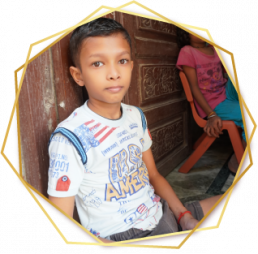
Saurabh’s parents soon noticed a significant change in their son. Despite the hurdles, he excelled in his studies. Saurabh’s story is one of perseverance, support, and the joy of learning, proving that education could triumph over challenges.
Bilaspur is a region in Chhattisgarh where education is a huge problem faced by the communities living there. Lack of access to quality education and infrastructure results in children dropping out of school and getting involved in child labor. The pandemic worsened the situation as children began facing issues with digital learning coupled with increased financial burden on the family. Thus resulting in children dropping out of school.
CRY America’s Project MMKSS works towards creating children’s collectives, sensitizing the School Management Committee (SMCs), ensuring children in the age of 3 to 6 years attend preschool, and teacher learning support is provided to teachers. The key activities under the project are linking children with scholarship schemes, vulnerability mapping and work regarding installation of kitchen gardens in model schools and Anganwadi Centers.
390
children collective meetings held
47
youth successfully admitted to college
114
children transitioned from Anganwadi Centers to Grade 1
323
children enrolled in Anganwadi Centers (3-6yrs)
145
girls trained on online safety
300
girls participated in the Period Shame campaign to try & break the taboo related with menstruation
40
irregular children (3-6yrs) regularized through Parent-Teacher Meeting

● All 5 School Management Committee (SMC) to be trained on Right To Education (RTE)
● School Development Plans (SDP) will be prepared in 6 schools through SMCs
● Project staff and Ward Parshad orientation on GPDP Plan
● Ensure 100 irregular Anganwadi children are regularized
● Atleast 50 adolescents to go for college admission by end of this year session
● Formation of 8 new Adolescent Girls Collectives and 4 new Boys Collective
● Ensure 20 children participate in school sports and also in community level they participate in sports event
2023 Grant Disbursed $21,182

Project KAS 2024
Breaking barriers with education
Mahesh, residing in a small village in Udaipur’s Kotra block, had a speech impediment that left him feeling isolated among the other children. Despite his family’s desire for Mahesh to receive an education, they hesitated due to the fear of potential bullying.
Change arrived when a CRY America project team established a Community Action Center (CAC) in Mahesh’s village, offering educational opportunities. The team, upon learning about Mahesh’s situation, convinced his parents that education was crucial for his future, and his speech impediment shouldn’t be a hindrance. They promised to educate other children against ridiculing Mahesh.
After persistent efforts, Mahesh’s parents agreed to let him attend the CAC. Overcoming initial shyness, Mahesh, with the support of the CRY team, started attending regularly. The nurturing environment allowed him to feel like a regular child in his village.

Today, Mahesh is an enthusiastic participant at the CAC, catching up on the education he missed. No longer burdened by shame, he communicates effectively, showcasing the transformative impact of CRY’s efforts. With newfound confidence, Mahesh’s future is now brighter than ever, demonstrating the potential for positive change in the face of adversity.
In the Kotra block of Udaipur, education of tribal children continues to be a matter of serious concern. Surveys and studies in southern Rajasthan repeatedly indicate that a large number of tribal children drop out after completing primary school or middle school. The major reasons for dropping out early from school besides poverty is the poor quality of education, non-availability and lack of accountability among teachers.
CRY America’s Project KAS is working to build capacity in the communities in order to ensure quality education for children. The project engages with the community and schools to mainstream drop out and never been to school children and also works at providing information on infrastructural gaps in health and hygiene with School Management Committees. Spreading awareness on the right to education, child protection and child labor issues and linking families with social security schemes are regular activities undertaken.
395
children enrolled in schools/centers
12
Appointment of 12 field teachers in project area
148
children irregular at school regularized
51
children participated in life skill sessions
34
meetings of the School Management Committees organized
415
Remedial support to 415 children to improve learning levels

● Regularizing VCPC meetings in 11 intervention villages
● Organise SMC meetings in 6 Primary and 3 Secondary Schools
● Engagement with 6 children collectives in 6 primary schools
● Life skill Orientation of the 6 school teachers and 5 CAC teachers
● Monthly Children Collectives meeting in each of the 6 primary schools. Similar meeting with 2 adolescent girls collective
● Formation of CBOs in 11 villages
● Parent teacher meeting to be held regularly by the 6 school teachers and 5 CAC teachers about learning levels and other issues
● 30 children will receive training and support for higher studies/vocational choices
● Assessment will be done for the requirement of AWC in the intervention village
2023 Grant Disbursed $30,852




















